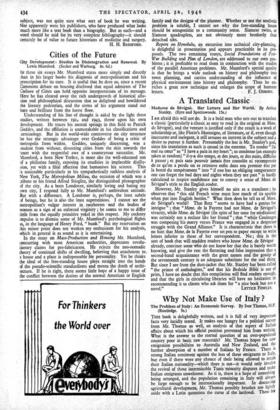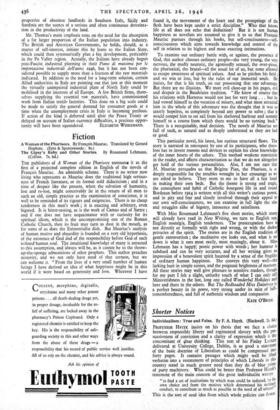Why Not Make Use of Italy ?
The Problem of Italy : An Economic Survey. By Ivor Thomas, M.P. (Routledge. 5s.) THIS book is delightfully written, and it is full of very important facts very lucidly stated. It makes one hungry for a political surveY from Mr. Thomas as well, an analysis of that aspect of Italian affairs about which his official position prevented him from writing. What is the answer to the eternal question of an over-populated country poor in basic raw materials? Mr, Thomas hopes for new emigration possibilities to Australia and New Zealand, and the further absorption of a number of Italians by France. There is strong Italian sentiment against the loss of these emigrants to Italy, but even if there were any chance of their being allowed to retain their Italian nationality—which there is not—it would only involve the revival of those interminable Tunis -minority disputes and make Italian emigrants unwelcome. As ti is, there is a hope of something being arranged, and the population remaining in Italy will always be large enough to be internationally important. In discussing agricultural development, Mr. Thomas possibly brushes too lightly aside with a Latin quotation the curse of the latifondi. These big properties of absentee landlords in Southern Italy, Sicily- and Sardinia are the scenes of a serious and often continuous deteriora- tion in the productivity of the land.
Mr. Thomas's main emphasis rests on the need for the absorption of a far larger proportion of the Italian population into industry. The British and American Governments, he holds, should, as a matter of self-interest, initiate this by loans to. the. Italian State. which could then systematically plan a big development, preferably in the Po Valley region. Actually, the Italians have already begun post-Fascist industrial planning in their Piano di massima per le importazioni industriali delranno 1946, but it has not been con- sidered possible to supply more than a fraction of the raw materials indicated. In addition to the need for a long-term solution, certain Allied authorities in Italy are pointing out that just at this moment the virtually unimpaired industrial plant of North Italy could be mobilised in the interests of all Europe. A few British firms, them- selves supplying the essential raw materials, have commissioned work from Italian textile factories. This done on a big scale could be made to satisfy the general demand for consumer goods at a time when the unemployment crisis in Italy is becoming perilous. If action of the kind is deferred until after the Peace Treaty or delayed on account of Italian currency difficulties, a precious oppor- tunity will have been squandered. ELIZABETH WISKEMANN.



























 Previous page
Previous page